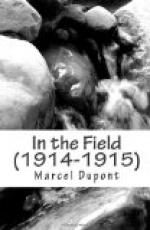But joy, stronger than bodily fatigue, predominated. It hovered over our harassed troops. Above all, they were proud of having been appreciated and congratulated by their brothers-in-arms of the crack corps which is the admiration of the whole army.
Each man forgot his tortured nerves, his aching head, his weary legs, repeating to himself the magic words:
“Your regiment is to be mentioned in despatches!”
VII. SISTER GABRIELLE
It was a very dark night. How were we to find our way about the little unknown town of Elverdinghe, near which our regiment had just been quartered? We could hardly make out the low houses with closed windows and long roofs of thatch or slate, and kept stumbling on the greasy and uneven cobble-stones. Now and again the corner of a street or the angle of a square was lit up dimly by a ray of light filtering through half-closed shutters. I went along haphazard, preceded by my friend B. We were quite determined to find beds, and to sleep in peace.
After our four days’ fighting near Bixschoote we had been sent to the rear, ten kilometres away from the line of fire, to get twenty-four hours’ rest; had arrived at nightfall, and found much difficulty in putting up our men and horses in the small farms around the town. But no sooner had they all found places, no sooner had the horses got their nose-bags on and the kitchen fires been lighted, than B., who was always anxious about the comforts of his board and lodging, said to me:
“There is only one thing for us to do. We are to rest. We must find a bed and a well-furnished table. I had rather go to bed an hour later, and sleep between sheets after a good meal, than lie down at once on straw with an empty stomach. Listen to me. Let us go on to that nice Belgian town over there, only a few steps farther. It is hardly ten o’clock. It will be devilish bad luck if we can’t find a good supper and good quarters. We need not trouble about anything else. Let us think first of serious matters.”
So we started for the little town which seemed to be wrapped in sleep. We knocked at the doors, but not one opened; no doubt the houses were all full of soldiers. No one offered us any hospitality, in spite of all B.’s objurgations, now beseeching, now imperious. In despair, I suggested at last that we should go back to our squadron, and lie down by our horses; but B. would not hear of it, and still clung to his idea: to have a good dinner, and sleep in a bed.
Just then, we saw a dark figure creeping noiselessly along under the wall. B. at once went up to it, and caught it by the arm. It was a poor old woman, carrying a basket and a jug of milk. Said he:
“Madame, madame, have pity on two poor weary, half-starved soldiers....”
But she couldn’t give us any information. Speaking in bad French, interspersed with Flemish, she gave us to understand that the little town was full of troops, and, at that hour, everybody was asleep.




